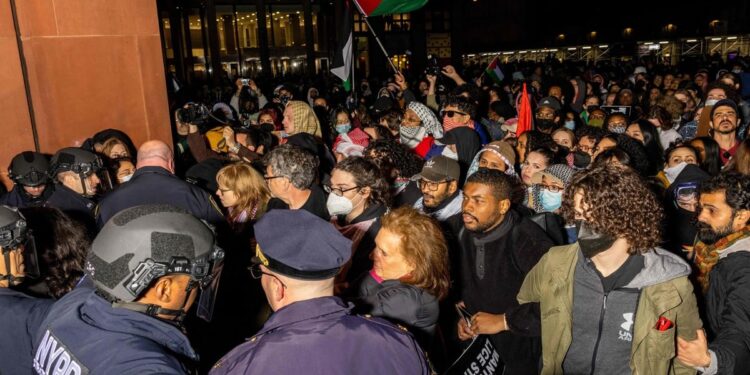More than 130 people were arrested overnight from Monday to Tuesday in front of the premises of the prestigious New York University (NYU) after pro-Palestinian student demonstrations, the latest episode of the turmoil caused by the conflict in Gaza on American campuses .
• Read also: Pro-Palestinian protests: Columbia University worried about student safety
• Read also: Around a hundred pro-Palestinian demonstrators arrested at Columbia University in New York
The 133 people were released, a spokesperson for the NYPD, the New York police, told AFP. They include students and faculty at NYU, according to accounts on social media.
But the lively debate, and the anger, are far from abating.
Many of the best-known American universities have found themselves at the heart of the news with the war in Gaza, triggered almost seven months ago by a Hamas attack in Israel.
Accused of not doing enough against anti-Semitism, two university presidents, including Harvard, had to resign a few months ago.
In recent days, several campuses have caught fire.
This new wave of protest started from Columbia University, in New York: around a hundred pro-Palestinian students, demanding an end to the war ravaging Gaza and that their establishment boycott all activities in link with Israel, were arrested there last week.
The president of Columbia called on the police to intervene.
“Mastered”
That’s also what happened at NYU, according to a university letter released by police calling on officers to “evacuate protesters.”
“If they refuse to leave, we ask the NYPD to take enforcement action accordingly, up to and including arrest,” according to this letter.
To justify its use of the police, the university claimed to have observed “hostile and disruptive public order” behavior.
“We also learned that there were intimidating slogans and that several anti-Semitic incidents had been reported,” a spokesperson wrote in a statement.
An association of NYU professors strongly denounced the university’s “capricious and unjustified” decision to call law enforcement to the rescue, further claiming to have observed no anti-Semitic behavior.
“No one in the square was, at any time, violent or anti-Semitic, either in words or gestures,” the American Association of University Professors said.
“The demonstration was certainly noisy but it was controlled. And the whole point of protests is to disrupt everyday life so that problems cannot be ignored,” she continued.
A demonstrator quoted by CBS explained that he wanted “our university to recognize that a genocide is underway and that there are Palestinian students who deserve to be heard.”
State Summit
The topic has turned into a heated and often violent debate over free speech.
Students and teachers accuse their universities of seeking to censor political speech, while several personalities, including elected representatives of Congress, in return accuse activists of fueling anti-Semitism.
At Columbia, a rabbi linked to an Orthodox Jewish student organization “strongly” advised Jewish students to return home, saying their safety was not guaranteed.
On Sunday, Democratic President Joe Biden himself intervened.
“In recent days we have witnessed harassment and calls for violence against Jews,” he said on Sunday, the eve of Passover.
“This blatant anti-Semitism is reprehensible and dangerous, and it has absolutely no place on college campuses, or anywhere in our country,” he added.
His rival for the November presidential election, Republican Donald Trump, made a point of speaking on the subject Tuesday morning, just before entering the courtroom for the resumption of his trial in New York.
“What’s happening at the university level, at Columbia, NYU and others, it’s a shame,” he said, referring to “very radical people who want to dismantle the universities.”
The debate has escalated to the UN’s Office of the High Commissioner for Human Rights, which spoke in Geneva on Tuesday of a “difficult balancing act” between freedom of expression and the possibility of “legitimate” restrictions. “.



